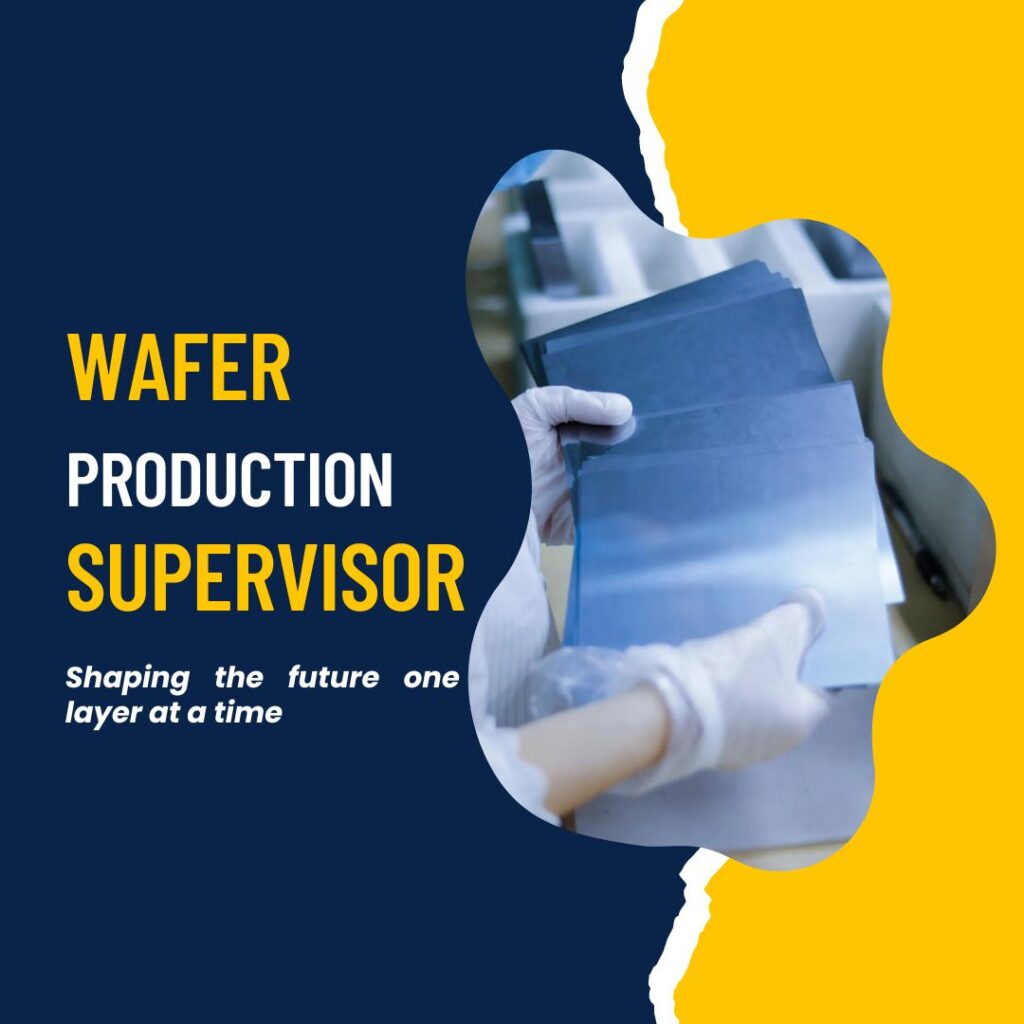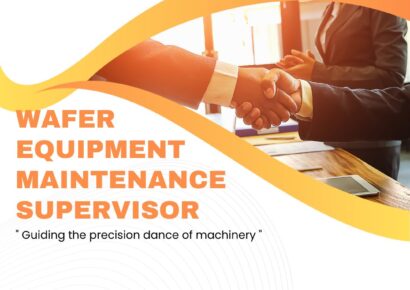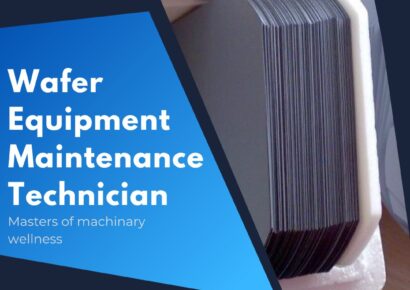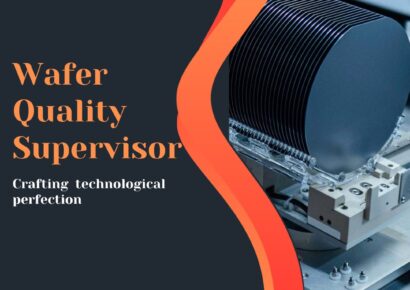Currently Empty: ₹0.00
About Course
A Wafer Production Supervisor oversees the manufacturing process of semiconductor wafers, managing a team and ensuring production targets are met. Responsibilities include coordinating workflow, implementing quality control measures, and addressing operational issues. The role requires strong leadership skills, technical expertise in wafer production, and adherence to safety protocols. Effective communication with team members and collaboration with other departments are essential for efficient production. Continuous improvement and optimization of production processes are key aspects of the Wafer Production Supervisor’s role.
What Will You Learn?
- The learning outcomes of a Wafer Production Supervisor typically include:
- 1. Leadership and Management
- 2. Process Optimization
- 3. Quality Assurance
- 4. Problem Resolution
- 5. Safety Oversight
- 6. Training and Development
- 7. Resource Management
- 8. Communication Skills
- 9. Continuous Improvement
- 10. Adherence to Regulations
- These outcomes collectively contribute to a skilled and effective Wafer Production Supervisor capable of leading a successful wafer production team and achieving production objectives.
Audience
- Qualification: B.tech
- Age: 24+ Years
- Experience: 3+ Years
Course Content
Introduction to PV Wafer
Photovoltaic (PV) wafers are crucial components in solar cell technology. These wafers, often made of silicon, serve as the substrate for solar cells. Through a series of manufacturing processes, PV wafers are transformed into solar cells that convert sunlight into electricity. The quality and efficiency of PV wafers impact the overall performance of solar panels. Ongoing research and advancements in PV wafer technology contribute to the continuous improvement of solar energy harvesting.
-
Wafer Manufacturing Process Flow
00:00
Wafer Quality
Wafer quality refers to the level of excellence and reliability of semiconductor wafers used in electronic manufacturing. It involves stringent inspection processes to detect defects, impurities, or irregularities in the wafers. High-quality wafers are crucial for the performance and reliability of integrated circuits and electronic devices.
Factors affecting wafer quality include material purity, crystal structure, and precision in manufacturing processes. Ensuring consistent and high-quality wafers is paramount in semiconductor production for optimal device functionality.
-
Wafer Inspection System Instruction Manual
00:00 -
Technical Standard for Inspection of Silicon Wafers
00:00 -
Patrol Inspection Knowledge Training
00:00 -
Training for Yield Quality Management Knowledge
00:00 -
Wafer Classification
00:00
Production
Wafer production is a key step in solar manufacturing, involving the slicing of silicon ingots into thin, flat wafers. These wafers serve as the substrate for solar cells, the building blocks of solar panels.
During wafer production, precision cutting and polishing processes are employed to ensure uniformity and quality. The wafers undergo further treatments, such as doping and coating, to enhance their ability to convert sunlight into electricity. Efficient wafer production is vital for the overall performance and cost-effectiveness of solar energy systems.
-
Equipment Operation Training- Multi Line Cutting Machine
00:00 -
Equipment Operation Training- Single Line Cutting Machine
00:00 -
Equipment Operation Training- Single Rod Squaring Machine
00:00 -
Instructions for Degumming of Wafers
00:00 -
Instruction for Inserting & Cleaning
00:00 -
Instructions for Inspection & Packing of Wafers
00:00 -
Instruction for Operation of Slicer
00:00 -
Operation Manual for Gluing Station
00:00 -
Safety Operation Rules for Seperators
00:00 -
Silicon Chip Insert Cleaning Machine Safety Operation
00:00 -
Silicon Chip Degumming Machine Safe Operation
00:00 -
Slicer Safe Operation
00:00 -
Standard for Gluing of Monocrystalline Silicon Wafers
00:00 -
Standards for Degumming & Inserting & Cleaning Process
00:00 -
Standard for Slicing Technology of Monocrystalline Silicon Wafers
00:00 -
The Stripper Operates Safely
00:00 -
Viscous is Safe to Operate
00:00
6s Occupational Health, Safety, and Environment (OHSE)
6S in Occupational Health, Safety, and Environment (OHSE) refers to a comprehensive system implemented in solar manufacturing to optimize workplace safety and efficiency. The 6S principles - sort, set in order, shine, standardize, sustain, and safety - guide practices for organizing workspaces, reducing hazards, and ensuring environmental responsibility. This framework focuses on enhancing employee well-being, minimizing waste, and promoting a culture of continuous improvement within the solar manufacturing process.
-
Workshop Management System Training
00:00 -
Common Sense of Workshop Environmental Safety
00:00 -
Team Safety Handout
00:00
Supply Chain
The supply chain in wafer manufacturing involves the procurement of raw materials such as silicon, chemicals, and gases. A streamlined supply chain ensures timely delivery of materials to support the production process. Coordination with suppliers, inventory management, and quality control are crucial for an efficient supply chain. Just-in-time practices minimize excess inventory, reducing costs and optimizing production flow. Continuous monitoring and improvement in supply chain processes contribute to the overall efficiency and competitiveness of wafer manufacturing systems.
-
Supply Chain
00:00
Manufacturing Execution System
A Manufacturing Execution System (MES) is a software solution that monitors and controls manufacturing processes on the shop floor. It collects real-time data, providing insights into production efficiency and performance. MES integrates with other systems to optimize workflow, track inventory, and ensure quality control. It aids in decision-making, enhances production visibility, and supports overall operational excellence. Implementation of MES improves responsiveness and agility in manufacturing, contributing to increased productivity and reduced costs.
-
MES System Theory and Application in Production
00:00 -
MES System Architecture
00:00 -
Data Acquisition System Introduction
00:00 -
Network & Hardware Equipment Theory
00:00
Workplace Help & Resources
Workplace Help and Resources in manufacturing provide essential support for employees. This includes access to safety manuals, training materials, and emergency contact information. Dedicated help desks or personnel assist with queries and concerns related to the manufacturing process. Resources may include troubleshooting guides and online platforms for continuous learning. Having readily available help enhances efficiency and ensures a well-informed workforce.
-
New Employee Orientation, Personnel System Training
00:00 -
Site Management Training
00:00 -
Induction Training for New Employees
00:00 -
Ability to Execute
00:00
Quick Review
A quick review typically involves summarizing key points or highlights of a particular topic. If you have a specific subject or context in mind, please provide more details so I can tailor the review accordingly.
-
Quiz
Tags
Instructors

RENX Academy
RENX offers best-in-class training solutions to various Industries and Manufacturing facilities. The courses have been tailormade for Various Skilled Technicians, Operators, Executives, Integrated line workforces, engineers and all kinds of associated partners for helping organisations to meet their manufacturing excellence.


- Intermediate
- April 16, 2024
- Certificate of completion





